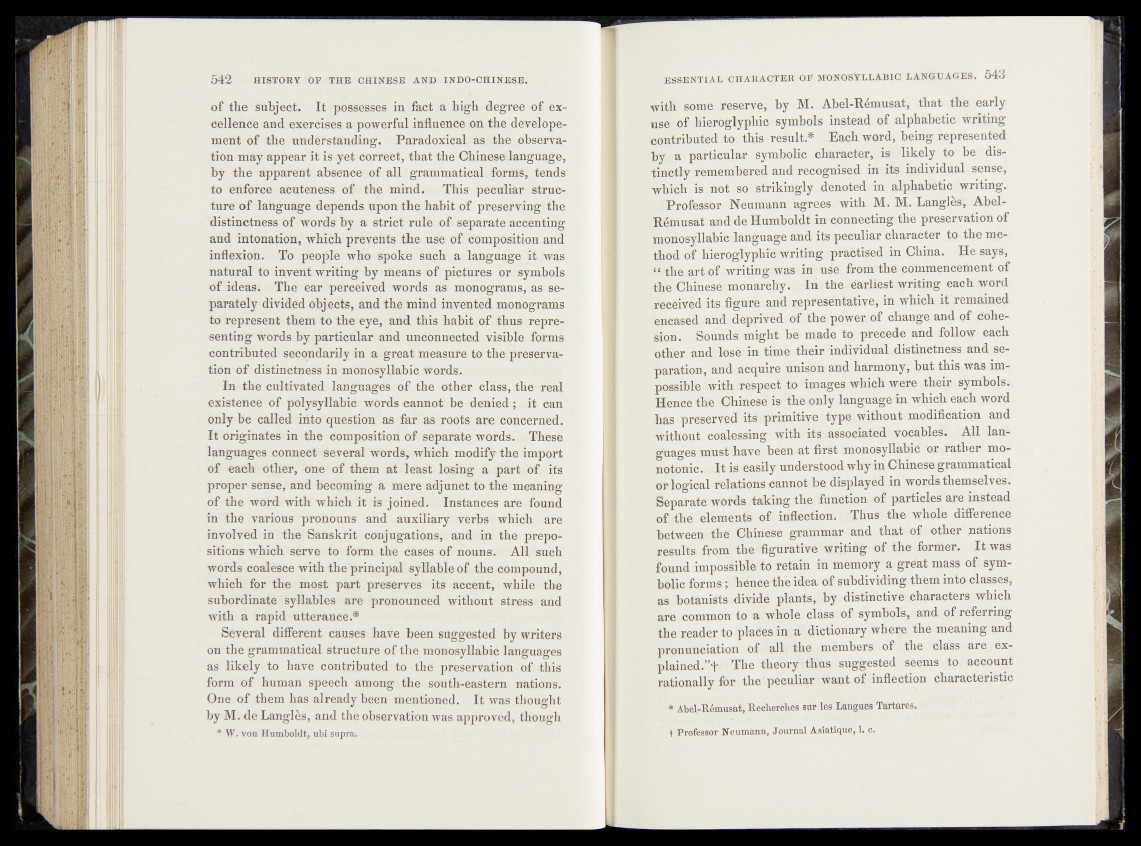
of the subject. It possesses in fact a high degree of excellence
and exercises a powerful influence on the develope-
ment of the understanding. ; Paradoxical as the observation
may appear it is yet correct, that the Chinese language,
by the apparent absence, of all grammatical, forms, tends
to enforce acuteness of; the mind. This peculiar structure
of language depends upon the habit of preserving the
distinctness of words by a strict rule of separate accenting
and intonation, which prevehts the use of composition and
inflexion. To people who spoke such a. language it was
natural to invent writing by means of pictures or symbols
of ideas. The ear perceived words as monograms, as ser
paratèly divided objects, and the mind invented monograms
to represent them to the eye, and this habit of thus representing
words by particular and unconnected visible forms
contributed secondarily in a great measure to the preservation
of distinctness in monosyllabic words.
In the cultivated languages of the other class, the real
existence of polysyllabic words cannot be denied^ it can
only be called into question as far as roots are concerned.
It originates in the composition of separate words. These
languages connect several words, which modify the import
of each other, one of them at least losing a part of its
proper sense, and becoming a mere adjunct to the meaning
of the word with which it is joined. Instances are found
in the various pronouns and auxiliary verbs which are
involved in the Sanskrit conjugations, and the prepositions
which serve to form the eases of nouns. AH such
words coalesce with the principal syllable of the compound,
which for the most part preserves its accent, whiles the
subordinate syllables are pronounced without stress and
with a rapid utterance.*
Several different causes have been suggested by writers
on the grammatical structure of the monosyllabic languages
as likely to have contributed to the preservation of this
form of human speech among the south-eastern nations.
One of them has already been mentioned. It was thought
by M. de Langlès, and the observation was approved, though
* W. von Humboldt, ubi supra.
with some; reserve, by M. Abel-R6musat, that the early
use of hieroglyphic symbols instead of alphabetic writing
eontributfid/to thia^result* Each word, being represented
by a particular symbolic character, is likely to be distinctly
remembered and recognised in its individual sense,
which is not so: strikingly dehoted in alphabetic writing.
, Professor Neumann agrees with M. M. Langl&s, Abel-
Rgmusat and de Humboldt in connecting the preservation of
monosyllabic language and* its peculiar character to the method
of hieroglyphic writing practised iirChina. He says,
„^Hthe art of writing was i® hs®v from the commencement of
the Chineses monarchy. In , the earliest writing each word
'» e iv e i# s figure and representative, in which it remained
encased and deprived of the, power of change and of cohesion.
.Sounds mighU'be made to precede and follow each
other and lose in time their individual distinctness and separation*
and acquire unison and harmony, but this was impossible
with respect to images5 which were their symbols.
Hence the Chinese is the pniy language in which each word
has preserved its primitive type without modification and
without coalessing with its associated vocables. All languages
must have been at first mohosyllabid or rather monotonies
>.It is easily understood why in Chinese grammatical
or logical relations eannot be displayed in words themselves.
Separate words faking the function of particles are instead
of the elements of inflection. Thus the whole difference
between the Chinese grammar and that of other nations
results from the figurative writing of the former. It was
found impossible to retain in memory a great mass of symbolic
forms ; hence the idea of subdividing them into classes,
as botanists divide plants, by distinctive characters which
are common to a whole class of symbols, and of referring
the reader to plades in a dictionary where the meaning and
pronunciation of all the members; of the class are ex-
plained.”f The thebry thus suggested seems to account
rationally for the peculiar want, of inflection characteristic
V'* Abel-R6musat, Recherehes surges Tongues Tartares.
\ Professor Neumann, Journal Asiatique,.!. c.